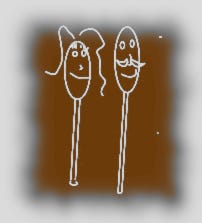Two Spoons met in a bowl of borscht, and the mood was tense. Their eyes locked passionately in love. Desire burned their every sense. Hence, They introduced themselves to one another. He said: "Hello, I'm Clarence." She replied: "And I'm Miss Prudence." Two Spoons met in a bowl of borscht; With the amorous details, we will modestly dispense. Two Spoons met in a bowl of borscht and created quite a stir. The forks found their morals most shocking and the butter knives began to demur. To be sure, They could never love another: She was caught by his lure And he was caught by her. Two Spoons met in a bowl of borscht: The proceedings we must ashamedly censure. Two Spoons met in a bowl of borscht; They spooned as long as they were able. Alas, they spooned out all the soup, and would soon be on the table. Thus in the middle of caressing one another, They began sorrowfully to weep and snivel. They exchanged one final heartfelt nibble. Two Spoons met in a bowl of borscht. They kissed in parting and whispered: "Adieu, farewell, I'll see you ladle." *** Writer's gloss: Yes, so it's a silly poem with cheap alliteration leading up to an awful pun. There will be no critics' awards for this nonsense. Still. Some of the best known poets had their light-hearted works.
Take William Shakespeare, for example. Everyone's heard of Shakespeare's Sonnets; but did you know that he had also penned a quarto of limericks, just for fun? Bill, at first, thought he could sell the book of dirty ditties under a nom de plume, like "Christopher Marlowe." However, Shakespeare's wife, Anne, thought that his pseudonym was transparent and his off-color, vaudevillian rhymes would never make it on Broadway. Shakespeare also dabbled with a new genre of theater - the culinary tragicomedy. His early drafts of “King Beer,” “Big Macbeth,” “Julius Caesar Salad,” “The Wine Merchant of Venice,” “Omelet,” and “The Taming of the Barbecue” gave his wife indigestion. In her opinion, this kind of dramatic cook book would flop like a bad souffle and ruin the Shakespeare brand. So she persuaded Bill to just read them to her in the kitchen and skip publication altogether.
Pretty much the same thing occurred with Homer. Of course, Homer authored those Greek classics “The Iliad” and “The Odyssey,” but he also composed a whole raft of dumb dithyrambs called “The Oddities.” Only a few of the Homeric jingles are known today such as "Helen of Troy - oh boy, oh boy!" and "May the Horse be with you." Because Sophocles wasn't born yet, and his Parthenon Poesy Web Site wasn't up and running on Substack, the majority of Homer's nonsense rhymes have all been lost to us, alas.
A similar fate befell the "lighter" works of Dante written when he was still a heavy-drinking frat boy at Sigma Zeta Pi at the U in Florence: "Oh, What the Hell?" and "Pair of (Fuzzy) Dice." Funny guy that Dante!
Ditto Edgar Allan Poe and his early poetical work he called "The Raving." Poe's publisher thought he was raving nuts, of course, and told him to cut out the cuteness, drop the wordplay and stick with things weird and mysterious (like crows) if he wanted to make any money at all selling poultry, er, I mean poetry.
Ah, but you say you crave something more meaningful from your poetry? You seek subtlety and sublimity; esoteric historical allusions; arcane symbolism sandwiched between obtuse phrases and similes? You want incomprehensible metaphors you can only understand with Cliff Notes and a semester long university course of study? You hunger for Nietzschean epigrams, for Freudian Id-analysis, for dionysian ecstasy and for intellectual profundity? Well look no more... at least not here.
This might be a wasteland, but it's definitely not T.S. Eliot's "Wasteland."
We aren't like fine dining at the Ritz. We're more into drive-by poetry, five cent White Castle hamburger poetry you can pick up by the bagful and swallow at a gulp. Burp and go. We might raise some eyebrows, but we don't expect any highbrows.



